Baltic Blue Growth
Farming mussels in the Baltic can be a sustainable blue business
Aquaculture in the sea is traditionally widespread in the Mediterranean and North Seas and at the European Atlantic coast. In the Baltic Sea region, it has been playing a very minor role. However, with the European Commission’s Blue Growth policy for sustainable growth in the marine and maritime sectors, aquaculture has received more attention in recent years, also in the Baltic Sea region. Mussels farmed in Baltic Sea waters are less appropriate for human consumption than mussels from the North or Mediterranean Seas, mainly due to their small size. Instead, they can be used in the feed industry to replace e.g. imported fish and soybean meal. In previous projects test scale pilots of mussel farms had been set up and examined in the Baltic Sea and had shown good potential in both economic and environmental terms. However, full scale mussel farms were not yet present in the Baltic Sea.
Mussel farms can clean the sea water
One of the most serious challenges the health of the Baltic Sea is is eutrophication, the enrichment of ecosystem by nutrients. By farming and harvesting blue mussels, nutrients can be removed from the sea water, because they filter large amounts of water for feeding. Blue mussel farming may be a stand-alone measure to counteract eutrophication, but can also become a business model.
Authorities and business need to be taken on board
Baltic Blue Growth aimed to proceed from pilot stage to real mussel farms by building awareness and capacity concerning blue growth and mussel farming among authorities, aquaculture companies, related associations, research organisations and other businesses.
Budgets
in numbers
-
4.65MillionTotal
-
3.57MillionErdf
-
0.00MillionEni + Russia
-
0.00MillionNorway
Achievements
Experimenting together: Practical experience with mussel farming all across the Baltic Sea
The partners started several new mussel farms and modified a few existing ones in the Baltic Sea: St. Anna archipelago, Byxelkrok, Västervik and Hagby in Sweden, Musholm in Denmark, Kieler Meeresfarm in Germany, Pavilosta in Latvia and Vormsi in Estonia. They proved that mussels can be successfully farmed on business scale in most of the Baltic Sea, if farming methods are adapted to the local conditions (e.g. water salinity, harmful substances in the water or the sediment, other uses of the sea). The project gave countries where no marine aquaculture was established before, namely Latvia and Estonia, a chance to gain some practical experience to better judge on the efforts it would take to develop this business. A strong push was given to mussel farming in countries that already had some marine aquaculture in place, namely Denmark, Germany and Sweden.
Mussels in poultry feed can be business
The project partners investigated the possibility to use mussels as an ingredient for poultry feed. The studies along the entire production line proved that mussels from the Baltic Proper could be used as a protein source in feeds for poultry. This would reduce the need to import feed from outside the Baltic Sea region and would result in re-use of nutrients in a local nutrient loop. In addition, mussel farms demonstrated positive effects on the environment by filtering the water and trapping excess nutrients.
Municipalities and companies are prepared to boost mussel farming
Through the Baltic Blue Growth project, municipalities in several countries learned that mussel farms offer a dual benefit to their regions: a business opportunity and a positive environmental effect. They gained knowledge not only about where mussels grow best, but also how to avoid conflicts with other uses of the sea, how to best arrange the planning processes for mussel farms and how to support farmers for the environmental services they provide. The project provided aquaculture companies interested in adding mussel farming to their business profiles knowledge about how to do this correctly and a tool to help them select suitable locations for farms. The results of Baltic Blue Growth are spread further through the project platforms BSR WATER, Blue Platform and Capacity4MSP. The Interreg project Baltic Blue Growth used EUR 3.57 million of support from the European Union to increase cohesion by creating new knowledge about mussel farming the Baltic Sea and by letting mussel farmers share their experiences.
Outputs
Plan your mussel farm: operational decision support platform
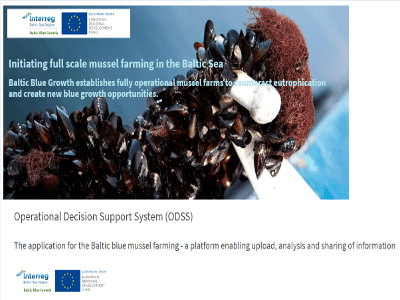
Factsheet: Advice for the future Baltic mussel farmer
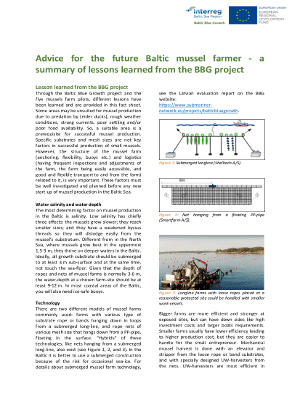
Report: Common methodological approach on addressing mussel farms in maritime spatial plans
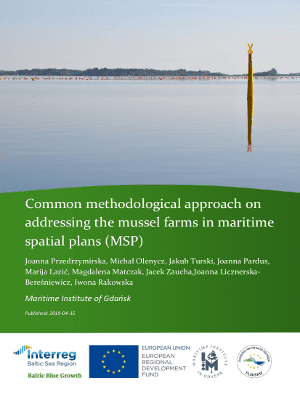
Report: How to turn Ecosystem Payments to Baltic Mussel Farms into reality?
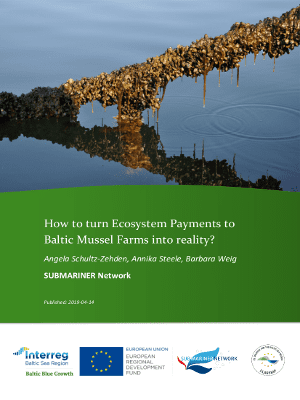
Factsheet: A trial of feeding poultry on blue mussels
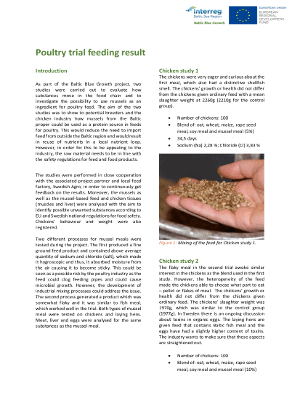
Project Stories
-
11.05.2021
How water-smart ideas make the Baltic Sea region thrive
From a rich marine life to beautiful vacation places, the Baltic Sea offers numerous resources that can be exploited to boost the economic growth of the region without harming its ecosystem. Interreg Baltic Sea Region funded multiple cooperation projects that have contributed to a sustainable and innovative blue economy. Good and successful examples of smart blue initiatives include ALLIANCE, Baltic Blue Growth, Capacity4MSP and Blue Platform.Read full story -
20.12.2016
Making legal requirement accessible to establish an environmentally friendly aquaculture in the baltic sea
Establishing environmentally friendly mussel aquaculture requires to follow necessary legal obligations in the EU. The project Baltic Blue Growth is making a concerted effort in explaining these requirements to its projects partners and others who are interested in pushing forward mussel aquaculture in the Baltic Sea.Read full story
Partners
Region Östergötland
- TownLinköping
- RegionÖstergötlands län
- CountrySweden
- RepresentativeLena Tasse 10-103 69 46
- Phone
- E-Mail
- Web
County Administrative Board of Kalmar County (CAB Kalmar)
- TownKalmar
- RegionKalmar län
- CountrySweden
- RepresentativeIzabela Alias
- Phone
- E-Mail
- Web
East regional Aquaculture Center (ERAC)
- TownVreta Kloster
- RegionÖstergötlands län
- CountrySweden
- RepresentativeJason Bailey
- Phone
- E-Mail
- Web
Kalmar municipality
- TownKalmar
- RegionKalmar län
- CountrySweden
- RepresentativeSusanna Minnhagen
- Phone
- E-Mail
- Web
Kurzeme Planning Region
- TownSaldus
- RegionKurzeme
- CountryLatvia
- RepresentativeZaiga Ozolina
- Phone
- E-Mail
- Web
Latvian Institute of Aquatic Ecology
- TownRiga
- RegionRīga
- CountryLatvia
- RepresentativeJuris Aigars
- Phone
- E-Mail
- Web
Maritime Institute in Gdańsk
- TownGda´nsk
- RegionGdański
- CountryPoland
- RepresentativeJoanna Przedrzymirska
- Phone
- E-Mail
- Web
Ministry of Energy Transition, Agriculture, Environment, Nature and Digitalization Schleswig-Holstein
- TownKiel
- RegionKiel, Kreisfreie Stadt
- CountryGermany
- RepresentativeRoland Lemcke
- Phone
- E-Mail
- Web
Municipality of Borgholm
- TownBorgholm
- RegionKalmar län
- CountrySweden
- RepresentativeKristin Bertilius
- Phone
- E-Mail
- Web
SUBMARINER Network for Blue Growth EEIG
- TownBerlin
- RegionBerlin
- CountryGermany
- RepresentativeEfthalia Arvaniti
- Phone
- E-Mail
- Web
Swedish University of Agricultural Sciences
- TownUppsala
- RegionUppsala län
- CountrySweden
- RepresentativeAleksandar Vidakovic
- Phone
- E-Mail
- Web
The County Administrative Board of Östergötland
- TownLinköping
- RegionÖstergötlands län
- CountrySweden
- RepresentativeMaria Åslund
- Phone
- E-Mail
- Web
University of Tartu
- TownTartu
- RegionLõuna-Eesti
- CountryEstonia
- RepresentativeJonne Kotta
- Phone
- E-Mail
- Web
Coastal Research and Management GbR
- TownKiel
- RegionKiel, Kreisfreie Stadt
- CountryGermany
- RepresentativePeter Krost
- Phone
- E-Mail
- Web
Orbicon Ltd.
- TownViby J
- RegionØstjylland
- CountryDenmark
- RepresentativePer Dolmer
- Phone
- E-Mail
- Web
Musholm Inc
- TownGörlev
- RegionVest- og Sydsjælland
- CountryDenmark
- RepresentativeTorben Wallach
- Phone
- E-Mail
- Web
EUCC – The Coastal Union Germany
- TownRostock-Warnemuende
- RegionRostock, Kreisfreie Stadt
- CountryGermany
- RepresentativeNardine Stybel
- Phone
- E-Mail
- Web
RISE Research Institutes of Sweden
- TownUppsala
- RegionUppsala län
- CountrySweden
- RepresentativeOla Palm
- Phone
- E-Mail
- Web
-
Project managerLena TasseRegion Östergötland
-
Legal representativeAndreas CapillaRegion Östergötland
-
Financial managerIlir PaqariziRegion Östergötland
-
Communication managerAnnika SteeleSUBMARINER Network for Blue Growth EEIG



